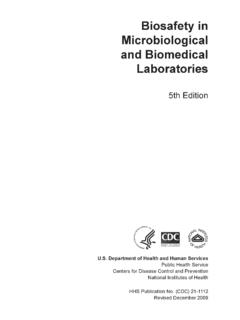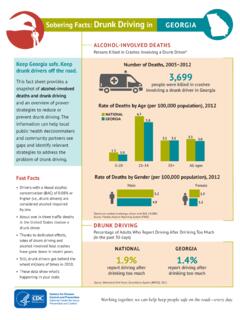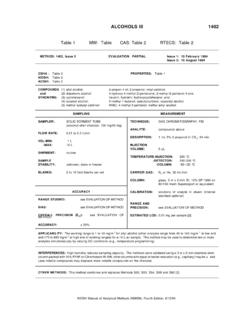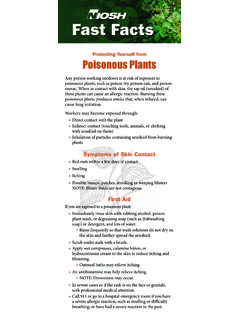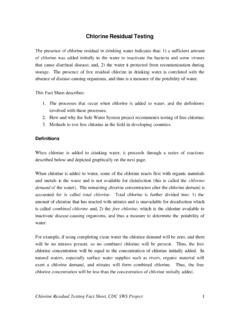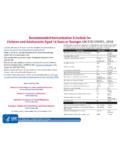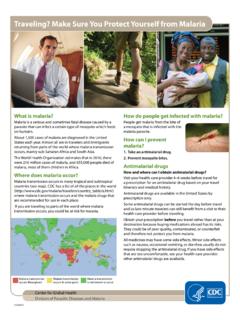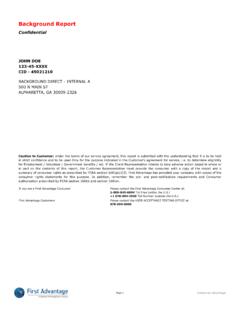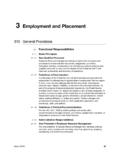Transcription of System Design Document - Centers for Disease Control and ...
1 System Design Document (High Level) Web-based User Interface Design for The NIOSH Industry and Occupation Computerized Coding System Version (Abbreviated) Prepared by S. Nowlin, J. Lu, G. Guo, J. Purdin, Y. Han Center for Disease Control and Prevention National Institute for Occupational Safety and Health December 22, 2010 Web-based User Interface Design Document for the NIOSH I&O Computerized Coding System Page ii Table of Contents Table of Contents .. ii Revision History .. iii 1. Introduction ..4 Background .. 4 Project Goal .. 4 Purpose .. 5 Disclaimer .. 5 References .. 5 Acknowledgements .. 6 2. User Interface Process Flow - High 3. User Classifications ..8 4. System Security ..8 5. Accessing NIOCCS ..9 NIOSH Industry and Occupation Coding & Support web page .. 9 NIOCCS Home Page .. 11 Logon .. 12 6. User Profiles (My Profile) ..13 7. Automatic and Computer-Assisted Coding ..13 8. Single Record Coding ..14 I&O Single Record Coding.
2 14 Crosswalk Single Record Coding .. 17 9. Batch File Coding ..19 I&O Batch File Coding .. 19 Uploading Data for I&O Coding .. 19 I&O Batch File Format .. 20 Batch Status .. 22 Computer-Assisted Coding (I&O) .. 23 Crosswalk Batch File Coding .. 24 Uploading Data for Crosswalk Coding .. 24 Crosswalk Batch File Format .. 25 Batch Status .. 26 Computer-Assisted Coding (Crosswalk) .. 27 Downloading .. 28 I&O Coded Data File .. 29 Crosswalk Data File .. 30 10. Reports ..31 11. Help and User Support ..32 NIOCCS On-line User Documentation .. 32 Providing Feedback and Reporting problems .. 32 Appendix A: Web-based User Interface Design Document for the NIOSH I&O Computerized Coding System Page iii Revision History Name Date Reason For Changes Version Nowlin 2/18/2010 Modified based on project team comments. Nowlin 3/31/2010 Modified based on project advisory team comments. Nowlin 6/30/2010 Added chapters 7 and 9 to improve clarity; modified I&O coding & support topic page layout and NIOCCS home page based on recommendations made by NIOSH /EID web team.
3 Nowlin 12/22/2010 Final edits after development began. Nowlin 1/11/2011 Created abbreviated version of Design doc for distribution at meetings and to post on the internet. Abbreviated Web-based User Interface Design Document for the NIOSH I&O Computerized Coding System Page 4 1. Introduction In June 2008, the National Institute for Occupational Safety and Health (NIOSH) approved a project to develop a new industry and occupation (I&O) computerized coding System that would reduce the high cost of manually coding I&O information found on worker records. Funded through the NIOSH National Occupational Research Agenda (NORA), the project began in October 2008. The first phase of the project, System Analysis, was completed in May 2009 producing the System Analysis and Software Requirements Document . We are currently in the second phase of the project, System Design , in which we are using the functional and non-functional System requirements gathered during the System analysis to produce a detailed System Design , or blue print, for the proposed System .
4 All System -related documents are developed by the NIOSH project team and reviewed by the project advisory team and other internal NIOSH stakeholders. The project advisory team was established in November 2008 and consists of internal and external stakeholders responsible for reviewing all project outputs in order to provide feedback to the System developers on the needs, priorities, and functionality of the System . The System to be developed is referred to in project documents as the NIOSH Industry and Occupational Computerized Coding System (NIOCCS). Background 1998 NIOSH released the Standardized Occupation and Industry Coding (SOIC) System o Codes I&O text to the Census 1990 classification scheme o Still used by several state vital statistics and health departments 2002 NIOSH developed an upgraded version of the SOIC o Lack of available funding at the time prevented completion of this upgrade 2006 NIOSH analyzed the feasibility of developing a new I&O computerized coding System using latest technologies 2008 NIOCCS Project was approved o Expected timeframe : Oct 2008 Sept 2012 Project Goal The overall goal of this project is to develop a computer System that will efficiently, accurately, and uniformly translate industry and occupation (I&O) narratives found on employment and health records to standardized I&O codes.
5 Web-based User Interface Design Document for the NIOSH I&O Computerized Coding System Page 5 Purpose The purpose of this High Level (abbreviated) NIOCCS System Design Document is to provide a shortened version of the full detailed user interface Design to facilitate sharing of information about the System at meetings and conferences with interested parties. To obtain a copy of the full NIOCCS System Design Document , contact Susan Nowlin or John Lu Disclaimer The findings and conclusions in this presentation have not been formally disseminated by the National Institute for Occupational Safety and Health and should not be construed to represent any agency determination or policy. References 1. NIOSH [May, 2009] System Analysis and Software Requirements Specification for The NIOSH Industry and Occupation Computerized Coding System , Version 2. NIOSH [2008] Industry and Occupation Computerized Coding System NORA Proposal 3. NIOSH [2008] I&O Autocoding Feasibility Report 4.
6 CDC / NCHS [2003] Instruction Manual Part 19, Industry and Occupation Coding for Death Certificates, 2003 5. Census Industry and Occupation Overview web site, , Accessed November 2009 Web-based User Interface Design Document for the NIOSH I&O Computerized Coding System Page 6 Acknowledgements NIOCCS Project Team members: NIOSH: John Lu, Suzanne Marsh, Susan Nowlin, Pam Schumacher, Girija Syamlal, James Walker, BJ Haussler SRA International: George Guo, Yuping Han, Jeff Purdin CDC: Norma McKee Univ. of Cincinnati: Ken Berman BLS: Dan Gillman Project Advisory Team members: BLS: Kate Newman Census Bureau: Rick Downs, Jennifer Day NAPHSIS Rose Trasatti NCHS: Chrissy Jarman NIOSH: John Wood California: Susan Payne Kansas Greg Crawford Michigan Glenn Copeland New Jersey Joseph Komosinski Washington Philip Freeman Web-based User Interface Design Document for the NIOSH I&O Computerized Coding System Page 7 2.
7 User Interface Process Flow - High Level Web-based User Interface Design Document for the NIOSH I&O Computerized Coding System Page 8 3. User Classifications Customer (User) Role Each user of NIOCCS will have the following functionality when using the web-based version of the software: a. Upload batches of records to be processed by NIOCCS. b. Perform Computer-assisted coding of records not automatically coded by NIOCCS. c. Download batches of records once all coding and quality Control have been completed. To understand how the screens described in this Document will function; the following fictitious user scenario will be used for demonstration: Scenario #1: The ABC University s epidemiology department has an occupational research group that often has a need to code the industry and occupation data found on worker employment and health records to standard I&O codes for analysis. The university has one trained I&O coder named Bob LeCoder.
8 Bob is responsible for all activities regarding the coding, quality Control , and management of I&O data for the department. Data is received sporadically by various research projects and is processed as it comes in. 4. System Security NIOCCS System security will be accomplished through the application of CDC security policies for web-based applications. The development team will work closely with the NIOSH Information System Security Officer (ISSO) to ensure CDC security requirements are followed. Once receiving an authority to operate, the System will be hosted on a secure CDC server. In addition to CDC application security requirements, the NIOCCS System will incorporate security measures to ensure that users have access only to their own data. NIOCCS security controls include: User Accounts Each user of the System must have a unique user account. The email address of the user requesting an account will be used as the account name. Passwords Each user account will be assigned a password.
9 The password will be initially assigned at the time of an account request but can be changed by the user via the My Profile System module. Web-based User Interface Design Document for the NIOSH I&O Computerized Coding System Page 9 5. Accessing NIOCCS NIOSH Industry and Occupation Coding & Support web page A new NIOSH internet topic page for Industry and Occupation Coding & Support will provide a portal for accessing the web-based version of NIOCCS along with information regarding I&O coding and NIOSH support. This page will include general information about I&O coding, notices about and registration for upcoming I&O coding training, I&O coding frequently asked questions (FAQ), links to related sites, and NIOSH contact information . The web page will also provide links to I&O coding software. To access the NIOCCS software, the user would click on the Software section on the example web page as shown below. Web-based User Interface Design Document for the NIOSH I&O Computerized Coding System Page 10 To access the web-based version of NIOCCS the user would click on the link identified in the NIOCCS section of the I&O Coding Software page.
10 Web-based User Interface Design Document for the NIOSH I&O Computerized Coding System Page 11 NIOCCS Home Page The Design for the web-based version of NIOCCS home page is shown below. The NIOCCS home page welcomes the user, provides a brief description of the System , and will display messages to the user as appropriate regarding notices such as recent updates, planned down times, etc. In this example, the user has not logged in to NIOCCS yet. Options provided in the menu are available without having a NIOCCS account. Users who wish to upload and process batches of records for I&O coding will be required to request a NIOCCS account. Once a NIOSH account is obtained and the user has logged in, the full NIOCCS menu will be displayed. Web-based User Interface Design Document for the NIOSH I&O Computerized Coding System Page 12 Logon Once a user has received a password, he/she may logon to the NIOCCS System .

